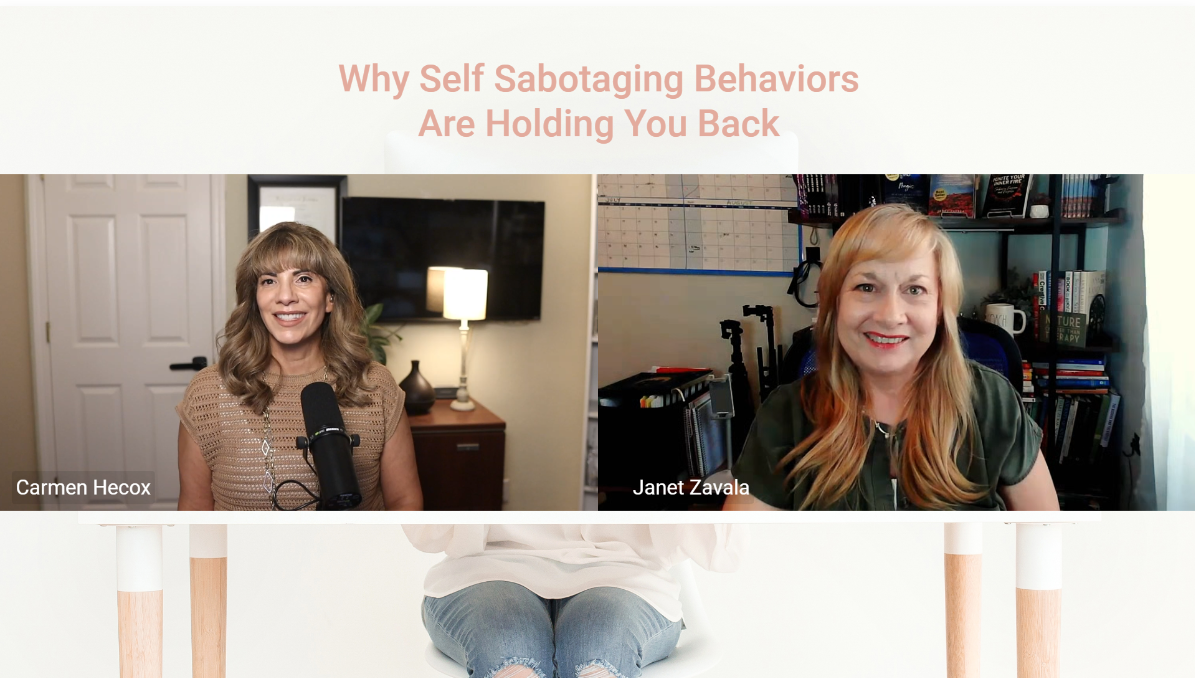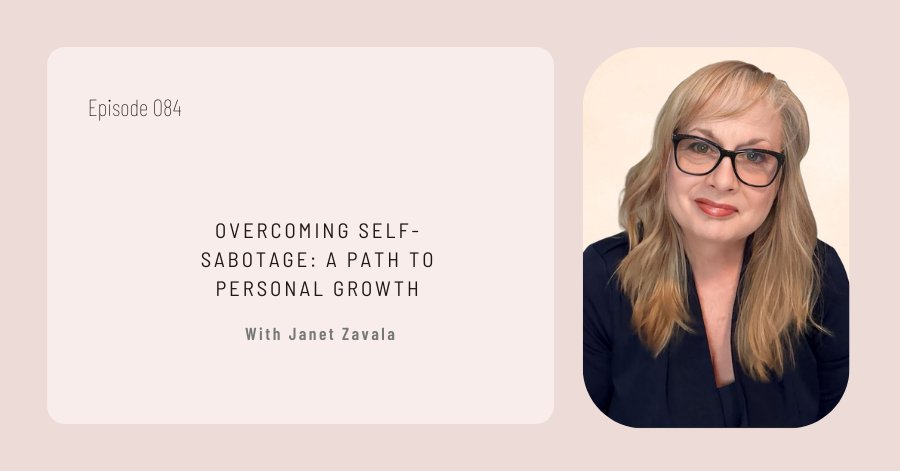Overcoming Self-Sabotage: A Path to Personal Growth
How to Identify and Break Free from Self-Defeating Behaviors

The Battle with Self-Sabotage: It Starts Within
Have you ever found yourself standing in your own way, holding yourself back just as you’re about to achieve something meaningful? Overcoming self-sabotage is a challenge many of us face, whether it’s in our personal growth, careers, or relationships. The good news? Self-sabotage doesn’t have to control us. We can recognize these patterns, confront them, and replace them with empowering behaviors that lead us toward success and fulfillment.
In my latest conversation with empowerment coach and midlife mentor Janet Zavala, we dive into how self-sabotaging behaviors emerge, why they persist, and the tools we need to break free. Janet shares her personal journey and practical strategies to stop holding ourselves back and start thriving in midlife and beyond.
Janet Zavala: A Guide to Personal Transformation
Janet Zavala is more than just a coach—she’s a mentor with decades of experience navigating personal and professional transformations. Having spent over 30 years in corporate life, Janet experienced firsthand the impact of self-sabotage. However, her resilience and commitment to self-growth allowed her to heal old wounds, reclaim her dreams, and become a published author and coach.
Today, Janet helps others overcome their self-doubt and regain control of their lives, empowering them to embrace the transformations they've always desired. Her story is a reminder that no matter how deep the rut, there’s always a path to freedom.

What is Self-Sabotage: The Coping Mechanism That Holds Us Back
Self-sabotage is a behavior pattern rooted in fear, uncertainty, and avoidance. Many of us develop these habits as a coping mechanism to protect ourselves from failure, rejection, or disappointment. While these behaviors may have served us at some point in our lives, they become detrimental as we grow and seek more from life.
Procrastination, perfectionism, and negative self-talk are some of the most common ways self-sabotage appears. These behaviors can be subtle, slowly eroding our confidence and success. Janet explains that self-sabotage is often a trauma response—a way we avoid pain or uncomfortable emotions by subconsciously creating roadblocks for ourselves.

Recognizing Self-Sabotaging Behaviors
The first step in overcoming self-sabotage is recognizing it. It often shows up in unexpected ways, like chronic procrastination or an endless quest for perfection. Many of us delay projects or hold ourselves to impossible standards, believing we’ll never be good enough.
Janet explains that procrastination isn’t always self-sabotage. But when it consistently prevents us from reaching our goals or causes negative consequences, it becomes a self-defeating behavior.
Perfectionism is another culprit. If we constantly criticize ourselves for not meeting unattainable standards, we may never move forward. It’s the ultimate roadblock to growth, keeping us stuck in an endless loop of doubt.
Join our community
Connect with like-minded individuals.

The Root Causes of Self-Sabotage
Low self-esteem, fear of failure, and a lack of self-confidence often lie at the heart of self-sabotage. These roots can run deep, sometimes stemming from childhood experiences where we were told to suck it up instead of processing our emotions.
Janet points out that these behaviors can be a result of unresolved emotions. Our generation was taught to suppress emotions, leading to habits like over-medicating, impulsive behavior, or avoidance through distractions like shopping or food.
This avoidance is a self-soothing mechanism, but it does more harm than good. The key to breaking free is acknowledging and addressing the root causes, allowing ourselves the grace to heal and grow.

Practical Strategies to Overcome Self-Sabotage
1. Cultivate Awareness Through Stillness and Reflection
Janet emphasizes that the first step to change is awareness. Begin by slowing down and observing your thoughts and behaviors without judgment. Meditation and journaling are powerful tools to help bring clarity and calm to your mind.
Stillness helps you witness your behaviors and recognize patterns, Janet says. Once you're aware, you can start addressing the root causes.
2. Challenge Negative Self-Talk
Negative self-talk is one of the most damaging forms of self-sabotage. Janet highlights that if we heard a friend being spoken to in the way we often talk to ourselves, we would immediately intervene. Yet, we allow ourselves to engage in this abusive dialogue.
It’s time to reprogram our minds. Janet suggests repeating positive affirmations and focusing on the good within ourselves. The more we tell our brain positive things, the more it will believe them.
3. Set Realistic Goals and Release Expectations
Janet advises setting goals but with realistic expectations. Letting go of the need for perfection allows us to focus on progress rather than outcome.
When you stop worrying about whether something will turn out perfectly, you give yourself the space to try, fail, and grow, she says. That’s where real progress begins.

Building a Supportive Community
Community plays a crucial role in overcoming self-sabotage. Janet stresses the importance of surrounding ourselves with people who lift us up rather than drag us down.
You need to find your tribe—people who will hold you accountable and cheer you on, Janet says. Avoid the dream killers, and instead, connect with those who support your journey.
Finding the right community, whether it’s through in-person relationships or online groups, can make all the difference in staying motivated and avoiding the traps of self-sabotage. Connection is essential for growth, especially in midlife when friendships and support networks tend to evolve.
Embrace Setbacks as Part of the Journey
Self-sabotage isn't something that disappears overnight. Janet shares her experiences with setbacks, reminding us that failure and setbacks are part of the journey, not reasons to quit.
Give yourself grace, she advises. Life will throw curveballs, but setbacks don’t define you. How you respond does.
When life becomes overwhelming, it’s easy to fall back into old habits. Whether it’s medical issues or personal challenges, setbacks are inevitable. But by embracing them and committing to getting back up, we can keep moving forward toward our goals.
Make Yourself a Priority
As we wrapped up our conversation, the final piece of advice was simple but profound: make yourself a priority. When you make yourself a priority, everything else falls into place. You’re able to show up fully for the people you love, pursue your passions, and live authentically, she shared.
Self-care isn’t selfish—it’s essential. Whether it’s taking time for rest, setting boundaries, or finding ways to nurture your mental and emotional health, prioritizing yourself allows you to live a life that’s both fulfilling and impactful.
Self-sabotage can feel like an overwhelming challenge, but with the right tools and mindset, it’s possible to break free and create lasting, positive change. By staying connected with insights, personal growth strategies, and empowering resources, you can continue to move forward with confidence and clarity. Through awareness, self-compassion, and the support of a strong community, we can all learn to stop standing in our own way and start moving toward the life we truly desire.
If you want to be the first to know when a new episode is released, sign up to receive those notifications.
Watch the complete interview here.

Additional Resources:


7 Effective Strategies to Transform Negative Thoughts
Redefining Success: Embracing Authenticity for Fulfillment
Subscribe to Apple Podcasts, and don't forget to Rate and Review
Like what you heard? If so, please rate and comment on Apple Podcasts. And while you are there, let me know what you want to hear next.
And while you are there, don't forget to hit Subscribe.


